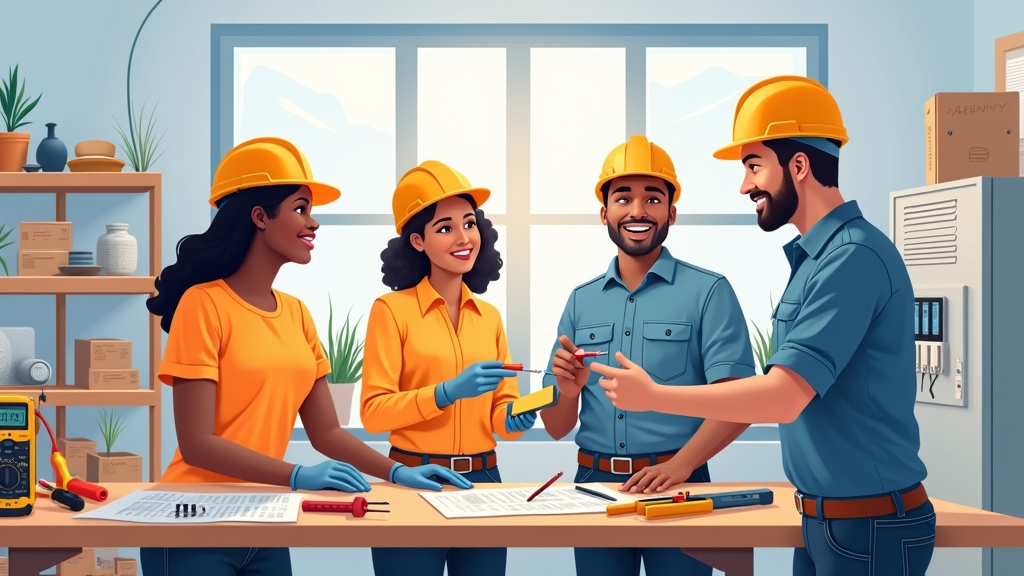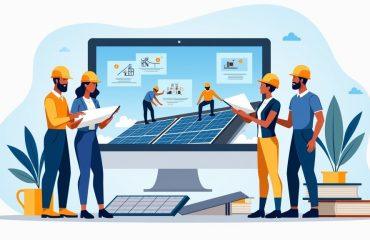advertising
Can you imagine having a profession that never goes out of date? Electricity is essential anywhere in the world, from homes to large industries. Becoming an electrician not only guarantees financial stability, but also the satisfaction of solving real problems. Imagine fixing an electrical system and seeing the lights come back on - it's a rewarding feeling!
Moreover, the demand for qualified professionals is only growing. With the expansion of renewable energies and home automation, the market is looking for electricians who understand both the basics and new technologies. And the best part? You can learn without spending anything. There are online coursesThere are also free materials and even government programs that offer quality training.
advertising
Another important point is versatility. An electrician can work on their own, in companies or even abroad, as the technical standards are similar worldwide. Want an example? A professional who learns how to install solar panels in Brazil can apply this knowledge in Portugal or Canada, with minor adaptations.
Finally, this career does not require a university degree. Of course, certifications help, but the focus is on practice. You can start with the basics and gradually specialize. How about taking the first step today?
Where can I find free electrical courses?
The internet is a gold mine for those who want to learn without spending money. Platforms such as Coursera It is edX offer online courses in partnership with renowned universities. Although some charge for certificates, access to the content is usually free. Have you ever thought about studying with professors from MIT or the University of São Paulo without leaving your home?
Governments and NGOs are also great sources. Many countries offer vocational training programs, such as the SENA in Colombia or the European Energy Center in Europe. Just search for local initiatives or even international projects that accept students of any nationality.
Don't underestimate YouTube. Channels such as ElectroBUILD and EF Elétrica teach everything from home installations to industrial motor repairs. The advantage? You see everything in practice, with real demonstrations. Watch, pause, repeat - learn at your own pace.
Finally, digital libraries such as OpenLearn of the Open University offer complete teaching materials. Books, videos and exercises are there, waiting for you. How about setting aside an hour a day to explore these resources?
What are the basic concepts that every electrician needs to know?
Before you start swapping wires, it's crucial to understand the basics. What is electric current? How do series and parallel circuits work? These concepts are the basis for everything. If you skip this step, you run the risk of making dangerous mistakes - and in this profession, mistakes can be costly.
Start with Ohm's Law, which relates voltage, current and resistance. Imagine a shower: if the voltage is too high for the appliance's resistance, it can burn out. This simple principle explains why certain equipment doesn't work in different countries. Want to test it? Use a multimeter (a cheap and essential tool) to measure resistance at home.
Another vital topic is safety. Electric shocks are no joke. Learn to turn off circuit breakers, wear insulating gloves and identify phase, neutral and ground wires. A useful exercise: simulate a power cut and try to identify the cables with just a test key. It sounds basic, but many accidents happen due to neglecting these details.
Finally, familiarize yourself with electrical diagrams. They are like maps that guide your work. Take a simple project, such as installing a light bulb, and try to draw it on paper. Then compare it with ready-made models. Little by little, you'll be ready for more complex systems.
How to practice without putting yourself at risk?
Theory is important, but practice consolidates learning. How to train without putting yourself in danger? Start with low-voltage projects, such as circuits with 9V batteries. Set up a small system with LED bulbs and switches - if something goes wrong, there's no risk of serious shock.
Another tip is to use simulators. Software such as Fusion 360 (for industrial projects) or CircuitLab allow you to create and test virtual circuits. Made a mistake? No problem. Restart and try again. It's like an educational video game!
If possible, get a mentor. Ask an experienced electrician to help you with simple jobs like changing sockets. Many professionals take on volunteer apprentices. You'll gain experience and, perhaps, a referral for your first job.
Finally, put together a "training kit" with basic tools: pliers, screwdriver, multimeter and discarded wires. Practice on broken household appliances (always disconnected from the mains!). Take apart an old fan, for example, and try to understand how it works.
Which Certifications are Worthwhile (Even for Free)?
Not all certifications require investment. OSHA (USA) offers free courses on electrical safety, which are recognized globally. The IEC provides technical standards that serve as a reference. Even without a physical certificate, this knowledge adds value to your CV.
Some platforms issue free certificates if you complete all the lessons. O Alison, for example, has a "Fundamentals of Electricity" course with a digital diploma. It's not as highly valued as a face-to-face technician, but it shows initiative - crucial for those starting out.
If you speak English, the program Energy.gov from the US Department of Energy has advanced materials on energy efficiency. Imagine adding "Knowledge of Solar Photovoltaic Systems" to your profile for free!
Finally, take part in webinars and workshops. Companies such as Schneider Electric often offer free training with certification. Keep an eye on social networks and newsletters.
How to Get Practical Experience without Working Formally?
Volunteering is an excellent option. Organizations such as Habitat for Humanity need help with construction, including electrical work. You learn, network and help communities.
Another idea is to offer simple services to friends and family. Changing a socket, installing a chandelier - ask permission to supervise a professional first. Write down each step and create a photographic portfolio. In the future, show these images in interviews.
Trade fairs and industry events are also useful. Many allow visitors to take part in practical demonstrations. Take your card and talk to exhibitors. They can point out opportunities or even test your skills on the spot.
Finally, create a profile on LinkedIn or on forums such as Electrician Talk. Share your projects and ask for feedback. The technical community is generous to those who show genuine interest.

What are the Next Steps to Becoming a Professional?
Master the basics and then specialize. Want to work with automation? Learn about Arduino and PLCs. Prefer solar energy? Study photovoltaic installation standards. Platforms like Udemy have cheap courses (many under US$ 20) in these areas.
Invest in a basic professional kit. A digital multimeter, pliers and a voltage detector are essential. Buy little by little - quality is more important than quantity.
Sign up to freelance sites like Upwork for small jobs. Even simple jobs give you real experience. And don't underestimate the power of a good CV. Include personal projects, such as "Home Lighting Installation" or "Home Appliance Repair".
Finally, keep up to date. Subscribe to magazines such as EC&M or industry blogs. Electricity is evolving fast, and your knowledge must keep up.
Ready to flip the switch on your new career? The road is long, but every step counts. Start today!



